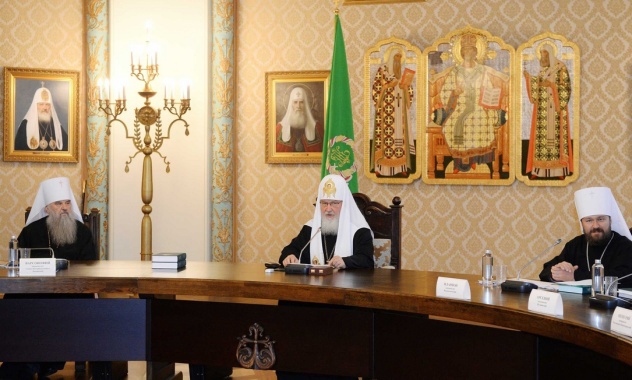Patriarch Kirill presides over a regular session of the Supreme Church Council
On June 13, 2018, His Holiness Kirill, Patriarch of Moscow and All Russia, presided over a session of the Supreme Church Council of the Russian Orthodox Church, at the Supreme Church Councils hall of the Cathedral Church of Christ the Saviour.
Opening the session, the Primate of the Russian Orthodox Church addressed himself to the participants in the meeting with remarks on the agenda and the forthcoming World Football Championship in Russia:
‘We are gathering together on the eve of a major event for our country – the World Football Championship. Many people will come from various countries of the world, and, as it happened in the situations when major international events are held in our country, many will visit Orthodox churches. For this reason, I would ask that we all should be ready to offer hospitality at the church platforms to those who will turn to us, who will ask questions and show interest in church life. In the first place, it is the duty of hospitality, but in addition it is our pastoral duty to answer questions from those to address them to us. I hope this major event will be a success and make a positive impact on the feelings of our people.
Certainly, to a great extent it will depend on the performance of our football team. It remains only to pray that everything may right and proper and, of course, to hope for the good precondition of our sportsmen’.
After the introductory remarks of Patriarch Kirill, Archpriest Maxim Kozlov, deputy head of the Education Committee, made a report on ‘Reforming the Theological Education System: Rising the Level of the Educational Process’. The Church Council saw video-reports from inter-disciplinary examinations held in theological seminaries in St. Petersburg, Ryazan and Vologda as examples of distance control over graduation examinations and defenses of graduation papers. An Education Committee member, being in chart, has an opportunity, if needs be, to ask questions in the capacity of the examination commission member who takes part in evaluating the level of graduate’s knowledge and papers.
The membership of the Supreme Church Council is as follows:
- Metropolitan Varsonofiy of St. Petersburg and Ladoga, chancellor of the Moscow Patriarchate;
- Metropolitan Hilarion of Volokolamsk, head of the Department for External Church Relations of the Moscow Patriarchate;
- Metropolitan Clement of Kaluga and Borovsk; chairman of the ROC Publishing Council;
- Metropolitan Arseniy of Istra, first vicar of the Patriarch of Moscow and All Russia for Moscow;
- Metropolitan Ioann of Belgorod and Stariy Oskol, head of the Synod Mission Department;
- Metropolitan Yevgeniy of Tallinn and All Estonia, head of the Education Committee under the Holy Synod;
- Metropolitan Merkuriy of Rostov and Novocherkassk, head of the Synodal Department for Religious Education and Catechism;
- Metropolitan Mark of Ryazan and Mikhalovsk, head of the Financial and Economic Administration of the Moscow Patriarchate;
- Metropolitan Kirill of Stavropol and Nevinnomyssk, chairman of the Synodal Committee for Cooperation with the Cossacks;
- Metropolitan Tikhhon of Pskov and Porkhov, chairman of the Patriarchal Council for Culture;
- Archbishop Feognost of Sergiev Posad, head of the Synodal Department for Monasteries and Monkhood;
- Archbishop Sergiy of Solnechnogorsk, director of the Administrative Secretariat of the Moscow Patriarchate;
- Archbishop Antoniy, head of the Moscow Patriarchate office for institutions abroad;
- Bishop Irinarkh of Krasnogorsk, head of the Synodal Department for Service in Prisons;
- Bishop Panteleimon of Orekhovo-Zuevo, head of the Synodal Department for Church Charity and Social Service;
- Bishop Serafim of Lyubertsy, head of the Synodal Department for Youth;
- Archpriest Sergiy Privalov, head of the Synodal Department for Cooperation with the Armed Forces and Law Enforcement;
- Archpriest Dimitry Smirnov, chairman of the Patriarchal commission for the family, motherhood and childhood;
- Legoida, head of the Synodal Department for the Church’s Relations with Society and Mass Media.
The following clergy were invited for the session: Bishop Savva of Voskresensk, first deputy chancellor of the Moscow Patriarchate; Bishop Mitrofan of Severomorsk and Umba; Bishop Nikolay of Balashikha, editor-in-chief, Moscow Patriarchate Publishers; Archpriest Maxim Kozlov, first deputy head of the Education Committee of the Russian Orthodox Church; Archimandrite Sacca (Tutunov), deputy chancellor of the Moscow Patriarchate; Sister Xenia (Chernega), head of the Moscow Patriarchate legal service; Archpriest Mikhail Vakhrushev, deputy head of the Education Committee; Rev. Alexander Volkov, head of the Patriarchal Press Service; Rev. Alexander Starodubtsev, expert in distance education technologies; A.V. Shchipkov, deputy head of the synodal department for the Church’s relations with society and mass media.
Patriarchal Press Service
DECR Communication Service
















